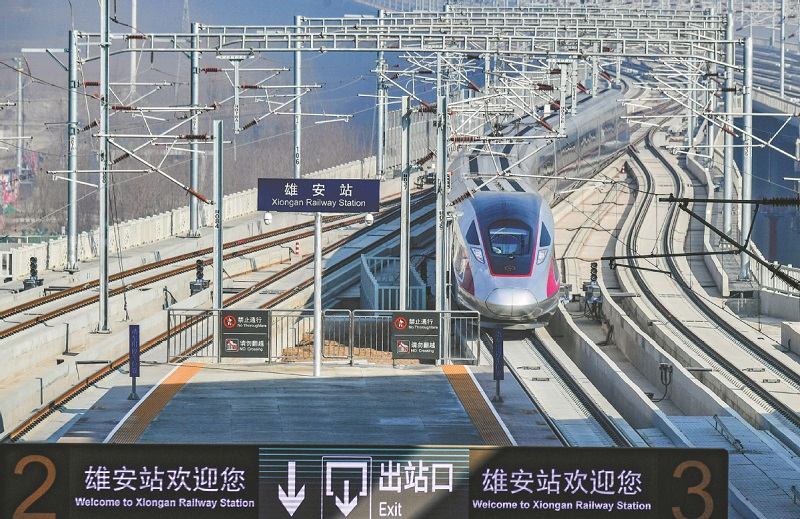Beijing, Tianjin, Hebei to come closer for development, according to local legislature

A Fuxing high-speed train arrives at Xiong'an Railway Station in Xiong'an New Area in Hebei province. [Photo by SUN LIJUN/FOR CHINA DAILY]
Cooperation on technology and innovation in the Beijing-Tianjin-Hebei region is expected to be accelerated with the launch of more projects for the development of cutting-edge technologies and new plans for smoother exchange channels.
The three local governments of Beijing, Tianjin and Hebei also said they will promote the growth of regional centers to fuel coordinated development in the region.
The national capital will advance the construction of the Jingjinji National Center of Technology Innovation, and guide and support innovative entities across the region, to jointly build startup incubation centers and pilot bases for shared outcomes, said Yin Yong, mayor of Beijing, while delivering the municipal government work report during the city's "two sessions" or the annual meetings of the local legislature held in late January.
The Jingjinji National Center of Technology Innovation, China's first comprehensive national technology innovation center set up in December 2020, has three branches: the Tianjin Center, the Hebei Center and the Xiong'an Center.
The coordinated development of the Beijing-Tianjin-Hebei region has been implemented for 10 years to 2024, with tremendous achievements made in multiple areas like industrial cooperation, healthcare, education and technology innovation.
The region is home to a number of top-class colleges and universities as well as high-end research talent. Hence it boasts a solid foundation for innovation. And the Jingjinji National Center of Technology Innovation has been one of the major moves in promoting regional cooperation in the field of technology.
Tianjin plans to accelerate work on its local center and expand comprehensive cooperation in technology and education fields with Beijing for its Tiankai Higher Education Innovation Park. The park was initiated by two esteemed universities in Tianjin: Nankai University and Tianjin University, Mayor Zhang Gong said while delivering the Tianjin government work report.
For its part, Hebei's local government said it will promote the Hebei and Xiong'an centers, but highlighted a different direction. It will strengthen the mechanism for achievements in technology and technological transformation, and smoothen communication on research and development activities between Beijing and Tianjin, as well as the digital transformation channel in Hebei, according to the provincial government work report.
"We have attracted multiple projects from Beijing and Tianjin to relocate and invest in the province with the help of the Hebei Center," said Liu Chuncheng, Party secretary of the Hebei Academy of Sciences, which led the launch of the Hebei Center.
The Hebei Center will conduct a thorough analysis of the industries in the province and local industrial centers to better attract targeted resources from Beijing and Tianjin this year, said Liu, who is also a local deputy of the provincial people's congress.
Many measures have been effected to restrain operations and businesses in Beijing that are not commensurate with the role of the city as the national capital. Relocation of certain entities in the fields of technology and education has thus become quite an attractive proposition for areas neighboring Beijing.
Beijing had witnessed a large increase in regional technology cooperation last year. Its technology contracts with Tianjin and Hebei were worth 74.87 billion yuan ($10.4 billion), up 110 percent year-on-year, data from the city government showed.
Xiong'an has set larger targets, including improving its Xiong'an Center. The Xiong'an New Area is to primarily serve as an alternative location for operations relocating from Beijing, said Tian Jinchang, deputy director-general of the Administrative Committee of the Xiong'an New Area and a deputy of the provincial people's congress.
The focus of work in Xiong'an has shifted to high-quality development, management and relocation, he said, adding they will promote the better utilization of the first batch of projects relocated from Beijing.
The Zhongguancun Science Park in the Xiong'an New Area has been one of the major projects to receive high-tech companies from Beijing. Since its unveiling on Aug 30, 35 companies have set up their headquarters here, the science park said.
Beijing will implement a new strategic cooperation agreement with Xiong'an, and will jointly build the rest of the Zhongguancun Science Park in Xiong'an, according to the Beijing government work report.
Zhang Junqi, head of one of the first batch of companies in the park, said the company's team decided to relocate to the science park from Beijing within two weeks because the park's preferential policies, like those for rent and environment, would facilitate their startup's growth.
- Top legislature schedules session for Wednesday
- China's top legislator meets with British PM
- China's top legislator holds talks with president of Senegalese National Assembly
- China's top legislator meets with Finnish PM
- Top legislator calls for advancing people's congress work in line with Party, State priorities



